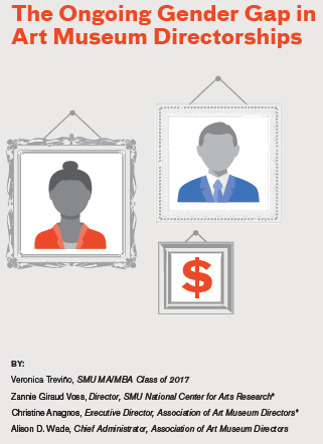One of the Boys
Posted by Nov 09, 2018

Dr. Zannie Giraud Voss
Being a woman in a leadership position at an arts nonprofit at this moment in history requires leading with integrity and delivering mission-driven results in a financially sustainable way. While the same mandates hold for men who lead non-profits, women have the added responsibility of paying it forward. It isn’t just about getting it right for yourself, your organization, and those you serve; it’s about getting it right for those who come after you. The emergence of opportunities for women in leadership positions is a recent phenomenon, and I am extremely fortunate to have been born in a place and time to benefit from the challenges overcome and stereotypes dismantled by those who’ve come before me. I am also fortunate to be passionate about arts and culture, a field that is more welcoming of women than many others.
With three brothers and no sisters, I grew up thinking I was one of the boys. My 4th grade claim to fame was being the arm wrestling champion of my class, and it was a source of pride that I could out-run one of my older brothers when we played tag football. The boy next door was altar boy to my priest when we played Mass. If you really wanted to get me mad, you’d tell me I couldn’t do something because I was a girl.
I share this background as a way of explaining that I don’t often think of myself in terms of my gender. My many role models are as likely to be women as men. I am amazed and awed by people who are strong, fearless, and generous. The times when I have encountered career hurdles, I’ve attributed them to other factors—e.g., someone else was more qualified, I was too timid, etc.—not to the fact that I’m female. The times when I have faced blatant gender discrimination I have called it out as directly and respectfully as I knew how, and with humor when possible. When someone is stepping on your toe, say “ouch.” I resist the idea that my potential is attenuated by a largely immutable characteristic.
 And yet I know that there is still work to be done to reach gender equity in the arts as elsewhere. As Director of SMU’s National Center for Arts Research—now SMU DataArts—I have had the pleasure of working with the Association of Art Museum Directors on research into gender equity in art museum directorships. It comes as little surprise that men outnumber women in leadership positions at the largest organizations, and female directors tend to have lower salaries than their male counterparts at similar size institutions. We have made progress, but we’re not there yet. SMU DataArts offers organizations a workforce demographics survey, since documenting the characteristics of those who work in the arts is a first step to understanding where we are versus where we want to be.
And yet I know that there is still work to be done to reach gender equity in the arts as elsewhere. As Director of SMU’s National Center for Arts Research—now SMU DataArts—I have had the pleasure of working with the Association of Art Museum Directors on research into gender equity in art museum directorships. It comes as little surprise that men outnumber women in leadership positions at the largest organizations, and female directors tend to have lower salaries than their male counterparts at similar size institutions. We have made progress, but we’re not there yet. SMU DataArts offers organizations a workforce demographics survey, since documenting the characteristics of those who work in the arts is a first step to understanding where we are versus where we want to be.
The following personal guideposts I share with women who seek to become leaders in their organizations or sectors. It’s the same advice I imparted to graduate students in arts management—80% of whom were female—during my ten years mentoring and teaching them at SMU.
- Live up to the standards you set for yourself, not those that others set for you. Most often, the standards that others set for you are too low. You know you can do better. Waiting for others to give you permission to realize your potential leaves you in a passive, victim position.
- Build people up. This falls under the general rubric of being generous in your praise and recognition when it is deserved, encouraging when you see effort, and intolerant of hurtful behavior in yourself and others.
- Get over the imposter syndrome. Develop expertise and don’t be afraid to exercise it. Many times I’ve been one of, at most, two women in a room full of men who wield power. When you’re present because you have expertise to offer, resist the impulse to demur and have the courage of your convictions. If you don’t, you’re doing a disservice to yourself and to the collective work that you’re there to advance.
- Make room for more chairs at the leadership table for future female generations.
Read more blogs on why Nonprofit Arts Women Rock!





